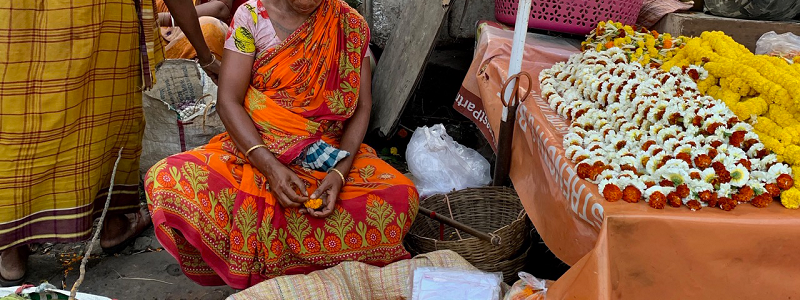Flower Power Blooms Again
No one can have missed the importance flowers play in the religious and cultural life of the sub-continent. All over the country one of the most common temple and shrine rituals is the offering of flowers to the deities, who are said to be pleased by such fragrant and beautiful gifts. More widely, flowers feature extensively in all aspects of Indian life: as well as beautifying rituals and prayers they are automatic presences at times of birth and death, in matrimony and medicine, in fact at any important occasion flowers lend their vibrancy, calm and silent eloquence. While generalised floral motifs, carved and painted, have embellished architectural structures since the earliest cave shrines dating back more than two thousand years, in everyday worship, particular flowers are traditionally offered to particular gods and hence hold a special significance. Laxmi, Goddess of Abundance, sits on a lotus and Lord Vishnu is believed to be born from one. The blood-red hibiscus is offered to Kali Ma and is symbolic of her courage and righteous anger. The jasmine is required for prayers to Hanuman, whereas the tulsi (both leaf and flower) is closely connected to Lord Krishna. Most commonly, the humble marigold is often seen during Ganesh festivities, but is also present for many other events, perhaps because this ubiquitous little orange flower is a symbol of the energy of the sun.
All well and good, but the unasked question is ‘What happens to all these blooms once they have served their purpose?’ The answer is that generally they are unceremoniously discarded into the nearest lake or river. The amounts involved are staggering: about 8 million tons chucked into India’s rivers each year. What is worse, these same rivers, considered holy by the faithful, are used for ritual bathing, even though their once sparkling waters are more likely to be a slimy murky grey, due to various types of chemical and industrial pollution as well as flower debris. Sacred streams such as the Ganges and the Yamuna are now, in many places, ecological disasters and health hazards to boot.
But some good news has just come in from this generally beleaguered ecological front line. Alert to the flower waste, in 2017 two enterprising young Hindus called Ankit Agarwal and Prateek Kumar launched a start-up called Phool (‘flower’ in Hindi) to collect used flowers from religious institutions in the north Indian state of Uttar Pradesh and recycle them into organic incense sticks and cones. This created income and jobs, mostly for women, in and around Kanpur, an ancient city on the banks of the Ganges. One day, after the enterprise had been going for about a year, they noticed that a white layer, naturally formed by microbial organic decay, had formed on a pile of waste flowers heaped up on their factory floor. This white layer was quite solid yet had a velvety, cushion-like consistency, not unlike leather. So they started making biodegradable packaging material from it, and animal-free leather was born.
The clever discovery could help counter the Ganges’ problems in more ways than one. The holy river, stretching 2,525 kilometres from the Western Himalayas to the Bay of Bengal passes through many population centres and is particularly polluted around Kanpur, because the city houses large numbers of tanneries, factories, chemical plants and slaughterhouses that dump untreated waste into its long-suffering waters. But now, Phool’s ‘fleather’ is not only turning a floral disaster into a blossoming new business, but it could also create a vegan alternative to the tanneries and the health problems they create. The team has made various product prototypes, including sling bags, wallets, trainers and sandals – although they have yet to start large scale commercial production as the material is still being fine-tuned to comply with international standards.
'Fleather' is already attracting global attention and was a 2022 finalist for the prestigious Earthshot prize that honours innovative environmental solutions. The start-up also won India’s Best Innovation in Vegan Fashion Award from the animal rights organization Peta. Phool has received around £8m from platforms investing in start-ups, with influencers such as Bollywood actress Alia Bhatt among its growing list of supporters. The business has expanded to 250 employees and currently recycles around six tons of waste flowers every day. And apart from 'fleather', it still manufactures incense sticks, cones and organic pigment powder for the celebrations of Holi, the springtime festival of colours. All in all, this new version of Flower Power seems here to stay.





